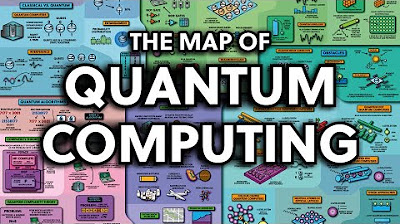Artur Ekert - Past, present and future of Quantum Information
Summary
TLDRThe speaker discusses the origins of their interest in quantum computing, tracing it back to the Einstein-Podolsky-Rosen paper and the complexities of defining quantum concepts. They emphasize that quantum computers will excel in unique problems, such as determining particle entanglement and simulating quantum phenomena, which classical computers cannot handle. The discussion highlights potential applications in energy efficiency, communication, and precision measurement, suggesting that quantum technology could transform various fields. By comparing the current state of quantum technology to early computer science, the speaker reflects on the unpredictable and exciting future of quantum advancements.
Takeaways
- 😀 The inspiration for the speaker's ideas on quantum computing originated from studying the EPR paper by Einstein, which focused on the concept of reality and locality.
- 🤔 The EPR paper highlights the challenge of defining physical quantities without disturbing them, a principle that is crucial in quantum mechanics.
- 💻 Quantum computers are expected to excel at solving problems that classical computers cannot, such as determining the entanglement of particles.
- 🔬 Quantum simulations can help us understand complex biological phenomena, like energy transfer in photosynthesis, which could lead to advancements in solar technology.
- 📉 As the complexity of quantum systems increases, classical predictions become harder, posing risks for theoretical physics if experiments cannot be reconciled with predictions.
- 🔧 Future developments will focus on creating tools and techniques that allow precise control over quantum systems, paving the way for advancements in quantum technologies.
- 🔒 Quantum cryptography and communication are anticipated to emerge as significant applications of quantum computing in the near future.
- ⏰ The potential for improved atomic clocks and better frequency standards could enhance precision in navigation and various sensing technologies.
- ⚡ The speaker likens the current exploration of quantum technology to the early days of electricity, emphasizing the unknown but vast potential applications.
- 🔮 While specific predictions about the future of quantum computing are challenging, the speaker expresses optimism about the groundbreaking discoveries yet to come.
Q & A
What was the origin of the speaker's interest in quantum computing?
-The speaker's interest began during their student days at Oxford when they encountered the original paper by Einstein, Podolski, and Rosen, which discusses the concept of reality in quantum physics.
How does the speaker define the concept of 'reality' in the context of quantum physics?
-The speaker notes that defining reality in the paper is closely related to the idea of obtaining information about a physical quantity without disturbing it, emphasizing the sophisticated nature of the concepts involved.
What distinction does the speaker make between classical and quantum computers?
-The speaker argues that quantum computers should not be expected to outperform classical computers on well-defined classical tasks. Instead, they are expected to solve a new class of problems uniquely suited to quantum capabilities.
What is an example of a quantum-specific problem mentioned in the transcript?
-One example is the problem of determining whether two quantum particles are entangled, which cannot be addressed by classical computers as it requires inherently quantum data structures.
What role do quantum simulations play in understanding complex systems?
-Quantum simulations can help analyze complex systems, such as the efficiency of energy transfer in photosynthesis, by allowing experimentalists to control parameters in a quantum system.
What potential applications of quantum technology does the speaker foresee?
-The speaker anticipates advancements in quantum communication, quantum cryptography, more accurate atomic clocks, and improved sensors for precision navigation as key applications of quantum technology.
Why does the speaker believe that predictions about quantum technology's future applications are challenging?
-The speaker compares it to asking early computer pioneers about the future of computers, noting that many applications that may arise are likely beyond current imagination and understanding.
What does the speaker suggest will be the focus of research and development in quantum computing over the next few years?
-The focus is expected to be on developing tools and techniques for better control over quantum systems, which will facilitate exploration of their potential applications.
How does the speaker relate quantum technology to historical technological discoveries?
-The speaker likens the potential of quantum technology to the discovery of electricity, emphasizing that while its specific applications are not yet clear, the inherent potential is undeniable.
What is the significance of quantum entanglement and superposition in future technologies?
-Harnessing quantum entanglement and superposition could lead to groundbreaking innovations, but the specific outcomes remain uncertain, making it an exciting area of research.
Outlines

This section is available to paid users only. Please upgrade to access this part.
Upgrade NowMindmap

This section is available to paid users only. Please upgrade to access this part.
Upgrade NowKeywords

This section is available to paid users only. Please upgrade to access this part.
Upgrade NowHighlights

This section is available to paid users only. Please upgrade to access this part.
Upgrade NowTranscripts

This section is available to paid users only. Please upgrade to access this part.
Upgrade NowBrowse More Related Video

Bell's Theorem Proves That Our World is Quantum, it Cannot Be Mechanical

The Map of Quantum Computing - Quantum Computing Explained

No, Einstein Didn’t Solve the Biggest Problem in Physics

క్వాంటం సైన్స్ తో కంప్యూటర్ విప్లవం ఎలా ? || Computer Revoluation With Quantam Science ||

NÓS devemos nos PREOCUPAR com o FUTURO da INTELIGÊNCIA ARTIFICIAL?

3 Quantum Computing Stocks That Could Change Everything
5.0 / 5 (0 votes)